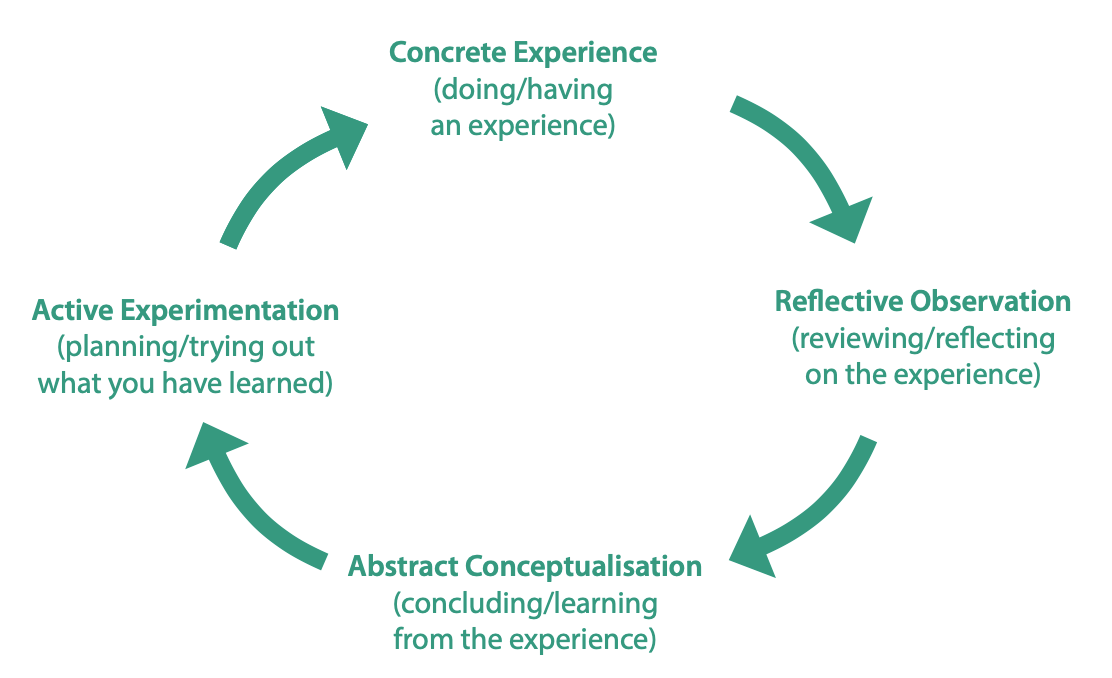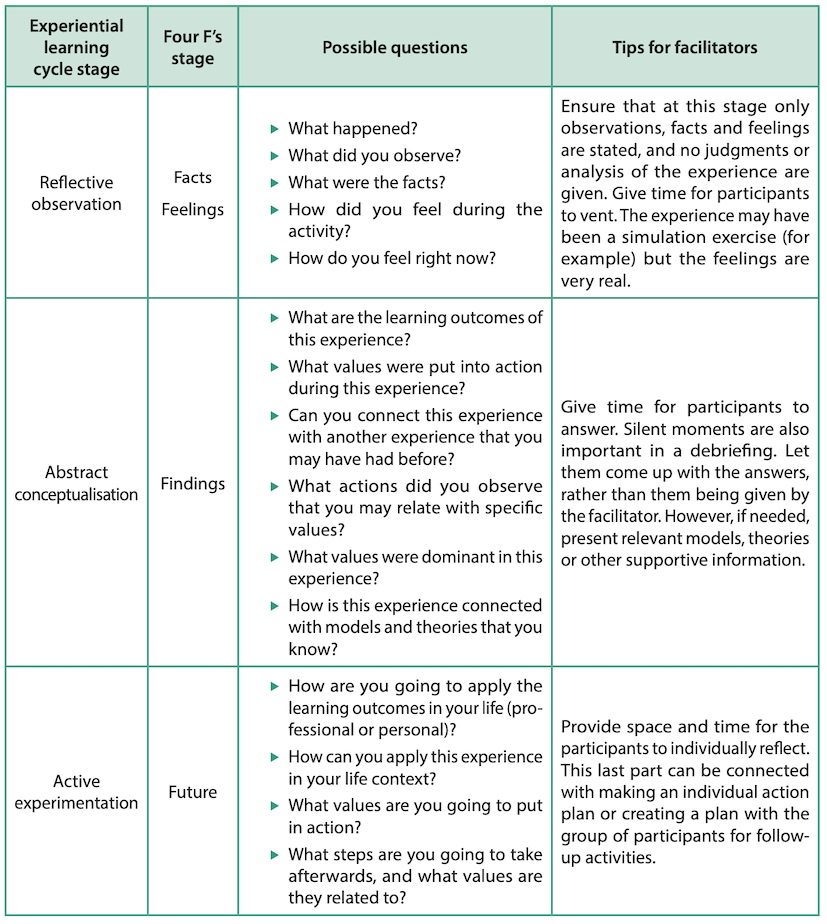1
Experiential Learning and Debriefing
Experiential Learning and Debriefing
Apie
The experiential learning cycle is a critical element in non-formal education and youth work training context. It integrates the learning process in different ways and areas.

Image source: T-Kit 14 – Value-based learning in mobility projects, Page 128
To understand it more thoroughly, watch the video, prepared by the International Youth Work Trainers Guild. The video focuses on essentials of the Experiential Learning and ways to structure debriefing of the experience.
After an experience in a group of participants, the debriefing is a key element following the experiential learning cycle. A debriefing is a guided reflection with the participant(s) undertaken by the facilitator to support reflection and integration of any experience as a learning outcome.
DEBRIEFING
Objectives for debriefing
- To share the experience in order to decrease the frustration; to express verbally some of the emotions and feelings that participants have had; to identify feelings
- To reflect upon the activity; to allow time for personal/group reflections; to share opinions f To enable participants to discover themselves; to air different points of view
- To conceptualise what has happened; to bring the ideas down from the “air” to the “ground”
- To introduce new elements; to see the interrelation; to answer the questions; to create new ones with a new dimension; to gain new knowledge; to find ways to transfer the knowledge to real-life situations; to share different perceptions and approaches
To see how to apply the learning; to develop empathy and flexibility; to describe the objectives of the activity; to help participants become aware of the aim of the exercise; to check if the aim has been met; to evaluate the process; to analyse how the learning process is going; to try to show the objective of the activity.
Debriefings are activities that may support three out of the four stages of experiential learning. Dr Roger Greenaway, an expert on training teachers and facilitators, developed a method that can be used in debriefings and is easy to connect with the experiential learning cycle. His model or framework is called the four F’s,196 and consists of the following:
- Facts: an objective account of what happened. What were the situations and events of the experience?
- Feelings: the emotional reactions to the situation. What did the participants feel during the experience and how do they feel after it?
- Findings: the concrete learning that you can take away from the situation. What were the highlights and conclusions from the experience?
- Future: structuring your learning so that you can use it in the future. Reflect and plan on how to use this learning experience in the wider life context.
Having this framework as an example, while not minimising other debriefing frameworks and models, can support understanding how to facilitate a debriefing in order to tackle the three stages of the experiential learning cycle.

Image source: T-Kit 14 – Value-based learning in mobility projects, Page 129
Many educational materials provide the facilitator with a set of debriefing questions for each activity. Bear in mind that a debriefing is always a flexible process, depending on the group, their feelings, interventions and experiences.
This can be a tough and unpredictable task for the facilitator; hence, it is important to prepare debriefings very well, and yet still be flexible. Make sure that as a facilitator you always have sets of extra questions prepared and are able to handle emotional participants, conflicts of opinions, and so forth.
To be on the safe side, it is a good idea to always have a second trainer colleague present (who has also witnessed the activity and the entire process), as a sort of backup (to throw in additional useful questions and suggestions on how to proceed), if needed.
And if by any chance as a trainer, you get lost in the many pathways of debriefing, it can help just to check in your head “where am I now in the series of WHATs?”
- What? (happened? did we experience?)
- So what? (why is that important?)
- Now what (what are we going to do with it?)
A major part of non-formal education, learning and sharing derives from good and well-led debriefings. So make them your priority or special discipline and keep on preparing, as well as improving them!
We selected you a number of ideas for methods for debriefing. You can find ideas on how to run a debriefing sessions by using various size of groups. Follow the link and explore how to organise solo reflection, reflection in pairs and larger groups: https://global.cityoflearning.eu/en/activities/7290
For more useful tips and hints, visit http://reviewing.co.uk
Sources of the activity content:
http://reviewing.co.uk/_site.htm
Activity content and badge issuing criteria aligned with the European Training Strategy (ETS) competence model for trainers to work internationally:
Competence in focus:
Stimulating active participation and motivating and empowering learners
- Knowledge of the dynamics of individual learning processes
- Knowledge of methodologies used in youth training
- Knowledge of Experiential learning and debriefing essentials
- Knowledge of methods for debriefing
- Skill to establish a supportive relationship with the learner
- Skill to support and encourage/confront learners in a useful way
- Skill to guide others to channel their feelings into action where appropriate
Gauk veiklos ženkliuką
Debriefing Pro Gauk šį ženkliuką
This badge shows knowledge and understanding about essentials of experiential learning, debriefing goals, structure and methods. Owner of this badge could watch videos, read methods and theories linked to experiential learning and debriefing.
Badge owner had to provide personal reflection about one’s own skills in facilitating debriefing with groups in the training setting.
Activity content and badge issuing criteria are aligned with the European Training Strategy (ETS) competence model for trainers to work internationally.
Learning duration: 1 hour
Užduotys
Užduotis nr.1
Įrodymus patikrino: vienas renginio organizatorius
Please share your personal reflection about your skills in facilitating debriefing with groups in the training setting. Focus on identifying your strengths and areas for development.
The task is complete after one of the trainers reviews and approves the evidence.
Įgūdžiai
ETS-TR
#Stimulating active participation and motivating and empowering learners
Organizatoriai
Awero
Badge issuer recognized with
Pakeisti į kitą kalbą:
